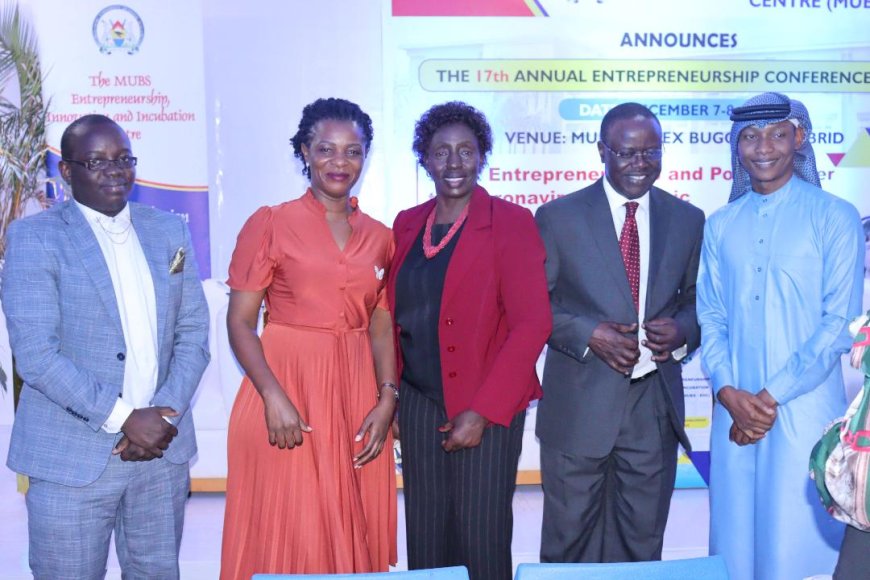Julius Nyanzi, Prof. Bioresearch advises youth that richness is within your surroundings
Nyanzi founded Prof. Bio-research in 2013 while in his second year at Makerere University. His ambition to pursue a career in pharmacology or the science of drug development, was hatched while at a tender age of ten when he was still in Primary 4.

KAMPALA - Julius Nyanzi, popularly known as Prof. Bioresearch urges youth to focus on their dreams and look around the environment because it possesses richness.
“I have come up with many innovations trying to show Ugandans that our surroundings possess riches, so identify an opportunity, believe in yourself and you will grow rich through your innovation,” he said.
He made the remarks during an exclusive interview with Journalists John kusolo and Felix Oketcho on the sidelines of the MUBS EIIC Annual Entrepreneurship Conference where he was invited as one of the panelists to inspire Youth.
He says he has a few subsistence growers in Uganda, but many of the out growers are from the neighbouring countries.
“In Uganda, I have out growers only in Luweero who are whites and others came from Rwanda, South Africa and Kenya; they own between 10 to 50 acres of land where they grow Stevia,” he says. He says he has already acquired himself an acre of land for study and research.
At the headquarters of Prof. Bio-research, located on second floor of the gigantic Equatorial Shopping Complex along Bombo road in Kampala, Julius Nyanzi is in high demand, just as much as the health products he sells.
Nyanzi founded Prof. Bio-research in 2013 while in his second year at Makerere University. His ambition to pursue a career in pharmacology or the science of drug development, was hatched while at a tender age of ten when he was still in Primary 4.
Nyanzi’s busy schedule is a sign of sweet success that has come his way at a young age of 32. It is also an indication of the continuing yearning for alternative medicines to manage the growing number of lifestyle health problems in the country.
Julius Nyanzi, 32, who graduated with a Bachelor’s Degree in Botany in 2014 from Makerere University, says sugar from Stevia is not only affordable, but also has several medicinal components.
Nyanzi, who is popularly known as Prof Green Sugar, produces two types of sugar from Stevia; Pure Stevia liquid of 30ml which he says is equivalent to 10kgs of artificial (traditional sugar) sugar and pure Stevia Powder of 90gms which he says is equivalent to 20kgs of artificial sugar. Pure Stevia Powder is also in 180gms which is equivalent to 40kgs of artificial sugar.
“90gms go for Shs18, 000 while 180gms go for Shs25, 000,” Nyanzi revealed in an interview with Business Focus on Saturday at his Equatorial mall based shop. The 30ml Pure Stevia liquid goes for Shs3, 000.
He adds that he gives free Stevia seedlings to his customers.
“Stevia is 200 times sweeter than artificial sugar and three drops of liquid Stevia are equivalent to two spoonsful of artificial sugar,” he reveals, noting that his Stevia powder sugar expires in a period of 2 – 3 years while the liquid one expires in a year.
He explains that diabetic people can take his natural sugar for it has no problems unlike the artificial one.
How He Discovered Stevia
Nyanzi says his love for research and science dates back to his childhood days. He notes that it was during his O’ Level at Old Kampala SS that he developed a dream of finding a solution for diabetes after learning that many people were dying from it.
This saw him study Physics, Chemistry and Biology at Maryland High, Entebbe for his A’ Level.
Challenges
He claims that there is a deliberate effort to sabotage his innovation because his natural sugar is giving artificial sugar dealers sleepless nights.
“Such a project would be a priority for NAADS and Operation Wealth Creation in Uganda. It has the potential to substitute some cash crops, but there is no good will,” he says, adding that he is disappointed that his innovation is not much appreciated at home compared to the way it has been received outside Uganda.
“There is no good will from the government, I get offers outside Uganda, but in Uganda, people just despise you. They don’t embrace us,” he says.
Born in a very religious catholic family to Mr. and Mrs Ben Bikolwa of Nakulabye, Nyanzi recalls that he witnessed a lot of spiritual intervention for nearly every problem that befell them including disease and death. Perhaps not accidentally, since several of his relatives were prominent priests and nuns in the service of God and the community.
It was during his s.6 vacation where Nyanzi spent most of his time in libraries and laboratories where he acquired a lot of insights into plants and their chemical attributes.
His pursuit for knowledge took him as far as the National Agricultural Research Laboratories (NARL), at Kawanda, where he linked up with lab technicians that helped deepen his knowledge on the subject. They also later helped him to secure his first job as a consultant with pioneer tissue culture firm Agro-Genetic laboratories (AGT) owned by Erostus Nsubuga.
During his one year stint at AGT, which also coincided with his first year at Makererere, Nyanzi not only honed his skills in tissue culture breeding, but he also learnt a few other tricks in business management besides establishing contacts that would later prove invaluable to his ambition.
Unlike many students who spend years in colleges and universities dreaming of a job somewhere after graduation, Nyanzi decided he would not wait for that but instead chose to dive straight into the tough world of business.
So in his second year at Makerere, he registered Prof. Bioresearch with the registrar of companies.
The idea of pursuing a career in pharmacology wasn’t novel to him given his history and experience. But as he explains, the field he was venturing into was filled with quarks who survived on exploiting gullible members of the public often by pretending to be experts in a field in which they had little or no training. “I thought that in order to distinguish myself from the rest, I should call my company Professional Biological Research. This however proved a mouthful. So I shortened it to Prof. Bioresearch hence the name of the company,” he notes.
He juggled books with entrepreneurship as he wrote business and fundraising concepts to banks and government departments in order to implement his ideas. Most of his fundraising efforts ended in futility as he faced frustrating demands by individuals in organisations that claimed to support youth entrepreneurship.
Using his savings and skills from AGT, he bought a pressure cooker and started to produce mushroom seeds to the nearby community in his home in Masanafu, Lubaga division. This too didn’t work out as demand was very weak.
Driven by his early desire to find a remedy for diabetes, and other diseases, Nyanzi thought of making sugar from Stevia, a wonder plant he heard read about. To his disappointment, the plant wasn’t available anywhere in the country, at least then. His contacts at AGT proved handy. He got in touch with an American friend he had met at AGT to help him find genetic material for the plant.
Still, America’s rigid laws concerning the transfer of live genetic material prevented the American friend from sending live plantlets from their botanical gardens.
Now Nyanzi proved his expertise as he advised the American friend to pack leaves with potassium solution for preserving the material, but also to overcome the legal impediments.
Company takes off from leaves
With Stevia leaves firmly in his grip, Nyanzi now fell back on his tissue culture breeding skills to grow whole new plants from leaves he received from the American friend. And yes, this marked a turning point in Prof. Bio-research’s journey as he realized his first product for the company and launched himself into the competitive world of commerce where he had something to sell.
In his second year at Campus, Nyanzi’s business ambition pushed him to look for a market for his stevia, even though he had no money to rent space in town. He targeted trade shows and exhibitions, starting with the Uganda Manufacturers Association -(UMA) trade fair of 2014.
But besides his apparent hard work and dedication towards his company, Nyanzi espouses grandeur ideas of self-sufficiency, prosperity and a community living in harmony with nature. In this regard, he has focused his research efforts on Uganda’s rich heritage of biological diversity not only as raw materials but also as vital tools for ensuring ecological balance.
He has also started several initiatives that seek to empower farmers, the youth as well as his colleagues in the herbal remedies industry. Nyanzi for example encourages and supports farmers to set up gardens for the high-value medicinal plants including giving them advice on management and marketing.
He has also started importing and selling machines that can be bought by the large-scale farmers as a way to increase the production of oils which he argues can be a raw material for so many things such as perfumes, medicines and inputs of other manufactured products.
He has also started a skills development programme for young people as well as his colleagues in the industry with the aim of raising their capacity to add value to their products.
Among some of his achievements, Nyanzi is proud of the 2015 KCCA young innovators award.
As he continues his quest to deepen his understanding of herbal medicine and its interaction with our bodies, Nyanzi, believes however that the industry cannot develop without active involvement of the government.
“We need an enabling law to regulate the sector. That law would create standards and guidelines regarding the development of herbal remedies. Such an intervention will go a long way in reducing the confusion in the industry, reduce quarks and unprofessional practices,” said Nyanzi.
Such a law would also help to create a clear distinction between the biomedical power of herbal medicine from the spiritual power that is currently being peddled.” Today some can claim that he can heal someone using spirits but they go ahead to administer herbs.”
Nyanzi also believes that a proper institutional arrangement that recognizes rather than demonise the power of herbal medicine is urgently needed not only to promote Uganda’s hugely untapped potential, but also to help build synergies among the different stakeholders.
“We need a platform that can bring together all stakeholders in the health sector including the ministry of health, National Drug authority, National Chemotherapeutic laboratories, herbalists and the academia to devise means of promoting herbal medicine, protecting our intellectual property and generally promote our economy and health.
The rapidly growing size of the company, coupled with rising customer demands mean that Nyanzi will have to think of other issues beyond scientific research in order to keep the company alive and growing.
Fortunately, it appears that Nyanzi’s superb managerial abilities as seen from the way he prevents collusion and conflict among staff in the young organisation, combined with constant mentoring, interaction and communication with staff and customers, will continue to guide the company’s operations and progress in the future and possibly be able to outlive its founder.
Additional source: sunrise.ug

































































































